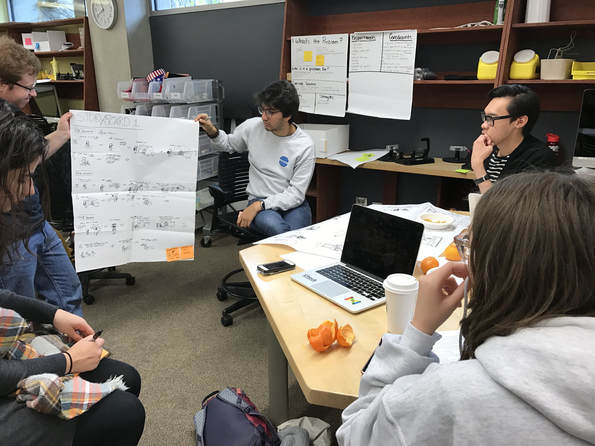how do we increase a US citizen's understanding of refugees,
without having them meet?
Foodiverse is a service that educates people about the Syrian refugee crisis from the window of a food truck. The experience immerses you in the story of a refugee from the minute you step in line, to your first bite of traditional cuisine.
Food is about shared experience, a great platform for engaging education and understanding commonalities.
Food is about shared experience, a great platform for engaging education and understanding commonalities.
cold interviews from a passionate crowd
|
San Francisco had numerous resources for refugees and protestors on every corner shouting "no ban, no wall." We wanted to know what made them so supportive of refugee efforts in the United States, and how we could transfer this trust elsewhere.
|
stories drove response
|
Our interviews were full of inspired retellings of refugee stories.
Each person we spoke with had seen or read something that convinced them refugees deserved a home here. Facebook videos, tweets, an article in the paper, even personal accounts. Everyone had a story that built trust. |
food, a perfect medium for shared experience
|
Social media feeds are based on friendships and user preferences. If someone supports the refugee ban and people with similar views, that's all they will see. This makes online media incredibly biased, so that one half doesn't get to experience anything about the other.
Food is all about shared experience. It brings strangers together through agreement on taste. Combine food with a powerful story, and you might just forge a relationship. |
lunch & learn at the farmers marketInitially, Foodiverse was a lunchbox learning tool. The service targeted elementary schools and offered foods from refugee nations paired with a refugee's story.
Testing at the local farmers market turned us in a new direction. While kids were not interested in our lunch, their parents were. Foodiverse became a lunch service for start-ups. Same food, same stories, new audience. |
the 50% education model
|
Upon returning to Evanston's campus, we redirected once more to the final concept. Let's bring education to everyone, not just the start-up scene.
Food trucks bring mobility to the story telling idea. User testing showed interest in the "50% education model." People wanted to learn, but not walk through a full teaching experience. |
building an experience
|
Users ordered from the menu during the annual Spring design expo. We served three Syrian dishes, each paired with true a story.
Chosen stories highlighted the lives of refugees in the United States. They removed war and focused on current aspirations and worries, like "will my daughter get into her dream college, NYU?" |
final design
|
Order your meal.
Read while you wait. Open for a surprise. |
|
Below is an example dish, Fattoush. We served this during the final design expo and it was the biggest hit. Nida's story brought one woman to tears while she ate. None of our stories focus on war or sadness. The true stories show refugees in a powerful light, making for a powerful take-away.
















